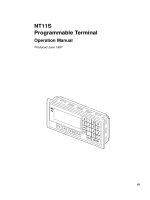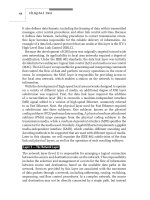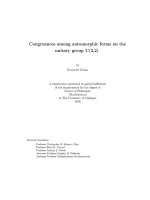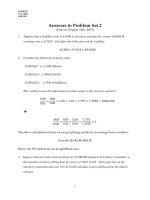OMGT2321_Global Operation Trade - Group assignment 2 (30%)_Presentation slides_Comparison Tanjung Pelepas port and Quy Nhơn port.
Bạn đang xem bản rút gọn của tài liệu. Xem và tải ngay bản đầy đủ của tài liệu tại đây (18.81 MB, 25 trang )
OMGT2321
GLOBAL TRADE OPERATIONS
ASSIGNMENT TWO
1
Table of contents
1. Overview
2. Description of the port
3. Competitive advantage
4. Comparative advantage
5. Operational challenges and recommendations
Tanjung Pelepas Port
Location
PTP is strategically located at the southern tip of the Malaysian
peninsula, confluent with the busy east-west trade lanes that pass
through the Strait of Malacca
Port of entry to Asean and Asia-Pacific markets for the region.
History evolution
The port became operational in 1999 and was officially launched in
2000
Within first 571 days, It handled 1M TEUs, creating a world record as the
fastest growing port and Malaysia 1st container terminal supassed 1M
TEUs.
Received the world's largest container terminal port of
Mediterranean Shipping Company in 2019
Major shipping lines and box operators use the port for reliable,
efficient, and advanced services, enabling shippers in Malaysia to
connect to global markets in a convenient manner.
2
02.
Description of
The Port
Description
Mode
Intermodalism
capabilities
Key import
The container storage facilities
span 290 acres capable of storing
6 million TEUs, more than 4000
reefer connections.
The port berths are served by 140
gantry cranes, 350 trailers, 45
post-Panamax cranes etc
(Joshi 2022)
The top imports are Integrated
Circuits, Refined Petroleum,
Crude Petroleum, Special
Purpose Ships, and
Broadcasting Equipment
(OEC 2020)
Infrastructure
Invoice, packing list, delivery
letter; leaflet, catalog or other
related documents, insurance
certificate, Bill of
Lading/Airwaletter of credit;
permit (ITA 2022)
The most recent exports are
led by Integrated Circuits,
Refined Petroleum, Palm Oil,
etc in terms of overall cost
(OEC 2020)
.
With an annual capacity of
12,500,000 TEU the Port of
Tanjung Pelepas (PTP) is
Malaysia’s most advanced
container terminal.
(APM terminals n.d.)
Key export
Required
documentation
for import
3
03.
Competitive
Advantage
Country level
INTERNATIONALIZATION
Both countries adopt several trade agreements internationally and regionally
Put a high emphasis on regional and bilateral trade agreements
Support local manufacturing and trading openness
Increase competitive edge as a production base in the world
market & attract more foreign direct investment
6
(ITA 2022)
Country level
SCIENCE AND INNOVATION
Malaysia
Impressive successes over
the past three decades:
primary commodities to
multi-sector economy
(MOSTI and MASTIC 2021)
Vietnam
Production resource
shortage and low quality,
independent and outdated
technology, bureaucratic
and corrupt administration,
and slow SOEs reform
(Hien 2018)
6
Country level
MACROECONOMIC SOUNDNESS
Malaysia
Ranking
Malaysia
Vietnam
GDP of USD
$358.6B ranked
the 37th
$245.2B
ranked the 47t
GDP 5-year
average growth
29th
17th
GDP per capita
67th
138th
Between 2010 - 2022,
averaging GDP
growth of 5.4%
Vietnam
Between 2010 2022, averaging
GDP growth of 3.6%
(World Bank 2022; Georank n.d.)
Country level
INFRASTRUCTURE
Malaysia
Prioritize infrastructure
works in rural areas,
including road maintenance
and upgrade works
Budget of US$20.43 billion
for 2023
(Woof 2022)
Vietnam
6% of its GDP on
infrastructure while other
countries in the region
spend an average 2.3%
Has a gap between its
current infrastructure and
its aspirations of being a
fast-growing economy
(Celina 2022)
Country level
INSTITUTIONAL SYSTEM
Malaysia
Vietnam
Over the past years,
Malaysia faced weak and
unstable political system
(Temjenmeren 2021)
Politically stable countries
in Southeast Asia
Malaysia’s ruling parties
will sign a coalition
agreement to ensure
greater stability (Kok and
Anisha 2022)
Its main aim is
economic growth
(GOV.UK 2021)
SUMMARY
International
Science and
innovation
Macroeconomics
soundness
Infrastructure
Institutional
system
Malaysia
Vietnam
- Both countries adopt international and regional trade agreements, reflecting the openness to trade
- Vietnam exports performance is greater than Malaysia
Updated technology, helping countries
improving the production and trading
Outdated technology, behind global leaders,
ineffective production and trading
- Strong economy background
- Prospective and stable growth
- Attract FDI
=> generating opportunities for trading
- Weaker economy background
- Less stable growth
- Attract FDI
=> less opportuntites to grow than Malaysia
Prioritize infrastructure works in rural areas,
including road maintenance and upgrade
works
Spend more in investing infrastructure but less
effective
- Unstable political system
- Ensuring greater stability
- Stable political system
- Strategic plan for economic growth
Industry level
Factor conditions
Malaysia's logistics industry
Strategic
Location
Located in the center of ASEAN communities and
is neighboring with Korea, China, Japan, and
India (MOT 2015)
Situated along one of the busiest shipping routes
in the world, the Straits of Malacca connects the
Pacific and Indian oceans.
=> Ideal position as a logistics and transshipment
hub for passenger and freight movement in region
and beyond (Ramli and Shakir 2021)
=> Not affected by US-China trade tension (MIDA
2021)
=> Regional gateway of RECEP for Chinese
companies to venture into ASEAN (MIDA 2021)
Vietnam's logistics industry
Logistical advantage that comes from being
located at the center of Southeast Asia and
its proximity to China (Bhatla 2020)
Long coast line close to many international
shipping routes (Emerhub 2020)
=> Vietnam is an ideal export hub to reach other
ASEAN markets (Nguyen and Mah 2022)
=> The strategic locations of the two nations are utilized by both to promote trade within the region
and around the globe. However, Malaysia takes advantages more than Vietnam, as evidenced by its
prominent position as a transshipment hub in the global logistics sector.
Industry level
Infrastructure
Factor conditions
Malaysia's logistics industry
Existing top-notch infrastructure regarding
extensive and well-linked transportation
network: roads, hinterlands, airports, maritime
and railways.
Huge investment in developing fully-equipped
infrastructure such as East Coast Railway Line
(ECRL) and KLIA Aeropolis (MIDA 2021a)
=> ensure efficient movement of cargoes and
passenger
=> support international trade activities in Malaysia
(MIDA 2021a)
=> providing an integrated, complete and
synergistic ecosystem (MIDA 2021a; Aeropolis n.d.)
Vietnam's logistics industry
Ranks 71 (out of 201 markets) in transport
network (scored 56.8 /100), with the limited
extent and quality of network infrastructure
(Vien Thong 2022)
Not all logistics facilities are located near the
ports and manufacturing hubs
=> Heavily congested, hinder movement of goods
and service
The government is putting funds towards
building and improving expressways, airports,
and ports such as Long Thanh International
Airport and North-South expressway.
=> In order to compete with regional players, both nations have made gains in funding infrastructure.
Malaysia, on the other hand, surpasses Vietnam regarding facilities, technologies, and connectivity
thanks to its modern infrastructure.
Industry level
Labor
Force
Factor conditions
Malaysia's logistics industry
Facing a shortage of qualified workers in logistics
industry that could incorporate technical skills to
operate newly adopted advanced technology (Wahab et
al. 2021; MIDA 2021b)
CEMCA strategic plan (2021-2017 conducted upskilling
blue-colour workers in logistics industry (CEMCA n.d.)
=> help employees migrate to new technological skill
requirements and assist them feel more secure in IR 4.0
era (Wahab1 et al. 2021)
Vietnam's logistics industry
Vietnam’s logistics HR are not only
insufficient in quantity but also weak in
quality (expertise and professionals)
(VIRAC 2019).
Among domestic enterprises, 93-95% of
workers are not trained in logistics due to
not many opportunities for staff to update
their skills and professional knowledge.
(VIRAC 2019).
=> Challenge the logistics industry
developement
Limited HR training improvement =>
logistics enterprises are mainly selftrained (VIRAC 2019).
=> Although both of countries are lack of high-skilled labor needed for logistics industry, Malaysian
government put more effort in enhancing and developing labor force than Vietnam => more chance to gain
competitiveness regarding labor.
Industry level
Rivalry and business policy
Malaysia's logistics industry
Vietnam's logistics industry
Competitive
Landscape
Freight and logistics market landscape is
fragmented with a large number of players
(PMI 2022)
=> fostering competition and specialisation (
Adopting M&A trend to gain significant market
share and rising demand (PMI 2022)
=> Expected to transform into a consolidated state
in the future
Operation licence requirements is high,
=> harmful to competition, high entry cost for
new companies (especially for SMEs), discourage
investments limited choice for customers
(Bernama 2021)
Transportation is (Nguyen 2022)in natur now
seeing a lot of competition, including
numerous SMEs and famous global companies
like DHL, FedEx, and Maersk (Nguyen 2022)
=> Intense competition among domestic logistics
companies and from foreign players (Nguyen 2022)
=> Adopt and encourage technology research and
application in logistical activities.
=> Leading to bottleneck due to fragmentation
(Nguyen 2022)
Both countries experienced high competition due to numerous SMEs in logistics sectors. However,
Malaysia gains more from competition by adopting more technology from big players.
Industry level
DEMAND CONDITIONS
A high level of customer needs is associated with logistics capabilities (Bowersox et al. 1999).
57% growth of the Asian e-Logistics market in 2020-2025 due to the rapid increase in e-commerce
=> E-commerce is driving consumer demand => increasing demand for logistics
Consumer
demand
Malaysia's logistics industry
Vietnam's logistics industry
Nearly 90% of Malaysian consumers have shopped
online in the past six months (Global Data 2022)
=> The Malaysian freight and logistics market is expected
to have a growth rate of more than 4% during the forecast
period (2022 - 2027) (Mordor Intelligence 2022)
Vietnam has the highest number of people shopping on ecommerce platforms in the Southeast Asia region at some
49.3 million (VNA 2022)
=> The fast-growing Vietnam e-commerce set high demand
for e-logistics development, with an expected growth rate of
42% in 2018 – 2022.
=> Increasing demand for logistics and transportation activities in Malaysia and Vietnam.
=> Compared to Malaysian consumers, delivery speed is a major factor affecting Vietnamese customer satisfaction and
retention
Industry level
Logistics
business
demand
DEMAND CONDITIONS
Malaysia's logistics industry
Higher demand from logistics businesses, especially
large companies such as DHL, Tiong Nam, or Ceva
to fulfill customer demands (Ken Research Private
Limited 2022.
=> Revenues for these companies have grown 14%
per year (Simply Wall 2022).
Vietnam's logistics industry
High consumer demand encourages traditional postal service
providers such as VN Post, EMS, and Viettel Post to respond to
the market by offering solutions for an online retailer and high
operational capacity.
Many e-commerce focused delivery start-ups obtained
significant financial support from investors like Giao Hang
Nhanh (GHN); Giao Hang Tiet Kiem (GHTK); NinjaVan.
(Bhatla 2020)
=> Increasing port container capability and replacement for better port equipment (quay cranes + container handlers) to
fulfill the high demand of customers and logistics firms from e-commerce platforms.
=> However, Vietnamese logistics firms suffer higher logistics costs (6-12%) than Malaysian firms since e-commerce
firms are forced to rely on cash on delivery (Bhatla 2020).
=> Compared to Malaysian e-commerce logistics, especially Vietnamese last-mile delivery firms have still been in the
early stage of development; thus, haven’t met online retailers’ requirements for timely, reliable, and cost-efficient
delivery
Industry level
ICT
industry
Related, supportive industry
Malaysia's logistics industry
The facility of smart logistics and warehouse also
improved its storage and warehouse pick-up efficiency
=> Overall accuracy of 99% in sortation and parcel
handling with lower management costs (MIDA 2022).
PISM along with the throughput increase, the port also
experienced a sharp decrease in ship‐waiting and
stand‐by rate (Bagchi & Paik 2001).
Vietnam's logistics industry
Most Vietnamese businesses are still not fully aware of the
need to invest in good logistics management compared to
Malaysian businesses.
Vietnam has the poorest freight infrastructure since most of
the seaports are not suited for loading and unloading
because of lacking adequate technological equipment for
loading and unloading products and telecommunications.
(Lang 2022)
=>Vietnam’s poorer application of information technology to logistics infrastructure.
Firm level
Tanjung Pelepas
Technology
innovation
Organizing
principles
Influencing
factor creation
Digital
roadmap
AI technology
& machine
learning
Smartrail System,
Vessel Clearance
Systems (VCS)
Deploy artificial intelligence to boost efficiency
and optimise scheduling
The super post panamax quayside cranes
A scanner that can tell the delivery truck the
location and time to stop
PTP has expanded terminal development
plans and is building a new berth to add 3.5
million TEUs by 2025.
Advanced training with top GE engineers and
exchanges overseas at GE centres
(Lloyd's List 2022; Finn 2022)
Quy Nhon
Automatic fee
collection
system
e-Port model
Terminal
Operating System
(TOS) software
Improving the quality of corporate governance
Reviewing and arranging of the use the workforce
appropriately
E- Port helps reduce many types of
paperwork
Plan to achieve a cargo clearance target of at least 1
billion tons by 2020 and 1.2 to 1.6 billion tons by 2030
The development plan for the 2021-2025 period calls
for an expansion of Quy Nhon Port to nearly 90
hectares
(Binh Dinh province 2022;
Vietnam Economic news 2022)
04.
Comparative
advantage
HECKSCHER-OHLIN MODEL
According to the H-O theory, countries will export goods that heavily rely on their abundant factor because of
differences in their factor endowments
Manufacturing parts and accessories for machines require high tolerance of precision in both quantity and quality to
assemble machines accurately.
The labor need to manage part complexity in machine, and strict tolerances so require the labor have knowledge, and
high skills to use tools and technologies to finish complicated parts => Ensuring right size, right shape, and material
for separate parts and accessories of machine.
=> Parts and accessories for office and auto data-processing is highly skilled-labor-intensive product .
MALAYSIA
VIETNAM
High-skilled labor force with tertiary education: 24.9%
Semi-skilled laborforce : 62%
Low-skilled labor force: 13.1%
(HRM Asia 2022)
=> Malaysia is a skilled labor -abundant country
Highly-skilled laborforce with enough expertise and
working seniority: 11%
Trained laborforce with degrees and certificates: 26%
Low-skilled labor force: 63%
=> Vietnam is an unskilled labor-abundant country.
Based on H-O model, Malaysia has more comparative advantage to produce Parts and
Accessories of office and auto data-processing machines
05.
Operational challenges
& recommendations
Lack of Effective Coordination
Challenges
Lack of network connectivity
between ports in Malaysia (Chen et al. 2016)
Lack of national strategy to coordinate the
ports (Azhar 2019)
Inconsistency and fragmentation among
port parties
Recommendations
A coordinated policy for Malaysian ports
including reducing excessive competition
between them, coordinating development
and allowing access to international players.
=> increase shipping lines and
transportation service , expand global liners
to operate in city-state (Azhar 2019)
Enhance infrastructure (road, railway), a
range of modal options (Acciaro and
McKinnon 2013)
Low digitalization process
Challenges
Reason: ports adapt with new digital
technologies, but people is the biggest
asset for the port
=> Lack of skilled employees is the
difficulty for port in digitalization
process
=> High technology goes with high
risk of security
Recommendations
Develop various digitalization platforms
Empower and develop employees
towards becoming a high performing,
especially for the blue-collar staff to
boost their performance and
productivity workforce
Digitize people as well as technology
=> Consistent productivity whilst
improving the Port’s current
performance









